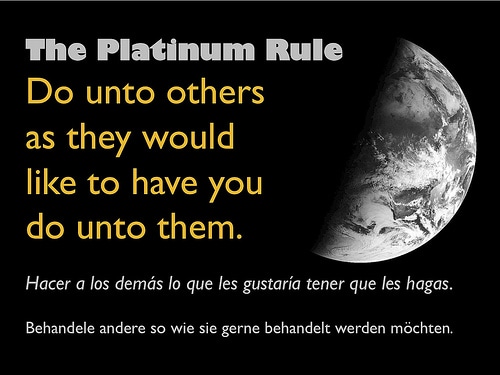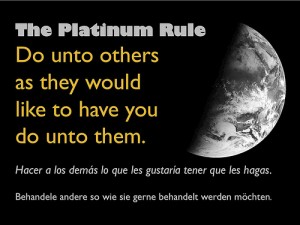The Platinum Rule
We all know the Golden Rule, but do you know the Platinum Rule?
Golden is: Do unto others as you would have them do unto you.
Platinum is: Do unto others as they would have you do unto them.
My brother told me the other day he had left his briefcase in a London taxi—with his passport in the case. He never got it back. That’s a clear case of the Iron Rule: whoever stole John’s briefcase was not interested in practicing the Golden version.
I think of the Golden Rule as covering basic human relationships—with people we don’t really know. If you’re in line at the supermarket with your cart overflowing and a woman, in a clear hurry, gets behind you carrying one box of Huggies, you’re golden if you say, “You go ahead of me.”
But the Golden Rule doesn’t always work with the people we know well, and certainly not with spouses and children or families of origin. There the relationships are far more fraught. The people we “love” are, unfortunately, the people we most need to control. They are also the people we most often use (in the name of “love”) to fulfill our own unmet needs. Usually that need is subtle; we’re not even consciously aware of it. The poor guy who gives his wife a negligee as a Valentine’s Day gift is being truly golden: he’s giving her what he would like. That’s pretty glaring. But Harville Hendrix tells a story in one of his books that illustrates a slightly subtler version.
A man was turning 40 and his wife, who loved him deeply, wanted to give him the best 40th bash ever. She booked a hotel ballroom, hired a jazz combo and invited 400 of their friends to come for the party (but to keep it a secret). She managed to pull off the whole affair. It was a smashing success. Loads of people came and danced till midnight. When it was all over, the man and his wife went home, kicked back and reviewed the glowing evening. He thanked her for all the work that went into such a gala.
“I will always appreciate it.” But then he added, “I need to say one more thing to you. You are the one who has always loved big parties. You have always known that I was the person who liked small gatherings of people, quiet enough so that we could exchange ideas.” He paused a moment. “The party tonight was wonderful, but it was really your kind of party and not mine.”
The woman had perfectly lived the Golden Rule. She had given him what she herself would have wanted. The Platinum Rule asks us to be highly aware of our own needs, and how that affects the way we “love” others. Our blindness, our capacity for self-deception is so great. Platinum love is able to sense the heart of the other, able to hear the deep yearnings and hopes of someone else. Platinum love—for me, at least—is able to bless, encourage and support the other’s small preferences and great aspirations, even when we don’t agree with—and may not frankly approve of—them. That’s love at the Platinum level.


I once was blind, but now I see! Ginny
Its difficult for me to appreciate how a business rule, the Platinum Rule should become associated and linked to a sublime and ancient rule like the Golden Rule. Where one is sublime in its wisdom and truly urges us to consider what it is we put out into the world the other encourages us to pander to the desires and whims of the individual, in order to sweeten that person up to us.
One rule is clearly spiritual and the other is clearly worldly and clearly directed and spawned for business purposes.
One encourages us to look at ourselves first as instruments for a better world and the other encourages us to use others as instruments for our own gain.
One feigns selflessness while the other makes self the clear focus.
Both seem to be trivialized as to their originally intended meaning and purpose and squeezed into a rather limited framework of day in and day out personal preferences.
One seeks to build empathy the other sympathy.
In short the Platinum Rule seems to come up short in truly encouraging human bonding but rather close in supporting civil and social constructs as it can help people live and work together… its good for team building. This seems to be ideal for keeping people together whether or not they value spiritual growth in each other. Settling.
The Golden Rule, is ancient philosophy focused on the nourishment of the soul, encouraging the individual to look inside himself to be aware of what he puts out into the world. This encourages us to stay the course and always keep spiritual growth of self a focus. Excelsior.
http://www.socialworktoday.com/archive/mayjun2008p16.shtml
http://en.wikipedia.org/wiki/The_Golden_Rule
http://www.hotel-online.com/News/PR2007_2nd/Jun07_GoldenRule.html
http://www.peopleskillsdecoded.com/empathy-vs-sympathy-the-big-distinction/
Why do you only consider the BUSINESS definition of the PLATINUM RULE? Embrace instead the underlying message – that ‘treating others in the way they would prefer to be treated’ rather than the more traditional, and imho – somewhat SELFISH golden rule ‘treat others how WE wish to be treated’ – perhaps you will understand why many of us do believe in the power of the platinum rule. I sullenly hear people vocalize “if only everyone worldwide followed the golden rule, there would be world peace…” How so, when values vary so vastly? It’s not about just ‘settling’ or personal gain- it’s about respect, care & concern for others’ values and wishes, tolerance – and i do believe TRUE EMPATHY. Not presumed empathy. The Golden Rule is a start, but will not itself bring about true understanding or respectful relationships, which let’s face it, is increasing complicated in our ever-evolving and growing planet….
Thanks for your reply.
I only consider the BUSINESS definition of the PLATINUM RULE for one simple reason. In my meagre research of the PLATINUM RULE, it appears first and foremost AS a BUSINESS perspective.
It is difficult for me to embrace its underlying message for one simple reason and that is: In life, as we struggle to understand the world around us and our place in it, especially through difficulties and hardships – in the end, it is our own selves that we must wrestle with, not merely to change our perspectives but our own lot in life if we so please.
My primary criticism and maybe my only criticism, is that the PLATINUM RULE, appears to me to seek remedy for difficulties in life by encouraging people, encouraging us, to seek the solution to difficulties outside of our selves. The idea that we should look away from ourselves in creating a better world, absolves us of the personal responsibility of making better decisions, the responsibility of doing the thinking to ensure that we are putting the very best foot we have forward.
From my perspective it asks us to pass that responsibility on to someone else, to relinquish responsibility and rely on someone else to make the tough calls as to what is best, not only personally but according to that second person’s own personal and subjective outlook.
SELFISHNESS is essential in human life and it is virtually impossible to avoid. Much like the idea that all is vanity, all is selfishness.
Im not sure that either of these rules will help to bring about world peace and I think I can understand the need for greater understanding in an ever complicated world but the PLATINUM RULE seems to defer, without, questions or condition to someone else’s idea of what is right through ‘true understanding or respectful relationships.’
The GOLDEN RULE imho is about love and about projecting it in the most unique way possible, through consideration about how one needs to be loved, and by encouraging us to put that out into the world, not simply as a responsibility to others (ie communicating what and how it is YOU want to be treated) but more so out of a responsibility to our very own selves. This is where I feel the PLATINUM RULE is maybe a bit misguided.
Take for example the folly of (and I admit the limited scope here, but do indulge me) a parent giving into the child (needs and wants alike) out of EMPATHY. The child might be crying for candy or food but the parent’s ability to sympathize and empathize needs to be rooted in an ability to decide alongside those things which is best. I honestly feel like the PLATINUM RULE asks us to empathize first and only, without setting boundaries and limits to what we would necessarily and reasonably endure in an effort to meet the ‘needs’ of others. This is, in my humble opinion, misguided because, I find it difficult to see just how we could create a better world for ourselves by simply giving up ourselves without first understanding or even coming to the point of asking ourselves what it is we are actually giving up. We must, in my opinion, first understand ourselves (be selfish and know how we want to be treated) before we can then love others with the same compassion that we have for ourselves. I think maybe this ability is most important.
We need self reflection first if our world is to improve, there is no way around that I feel.
Just reread this, David. I’m passing it on to friends I love. Thank you!
Thanks for reading, re-reading, and passing along!